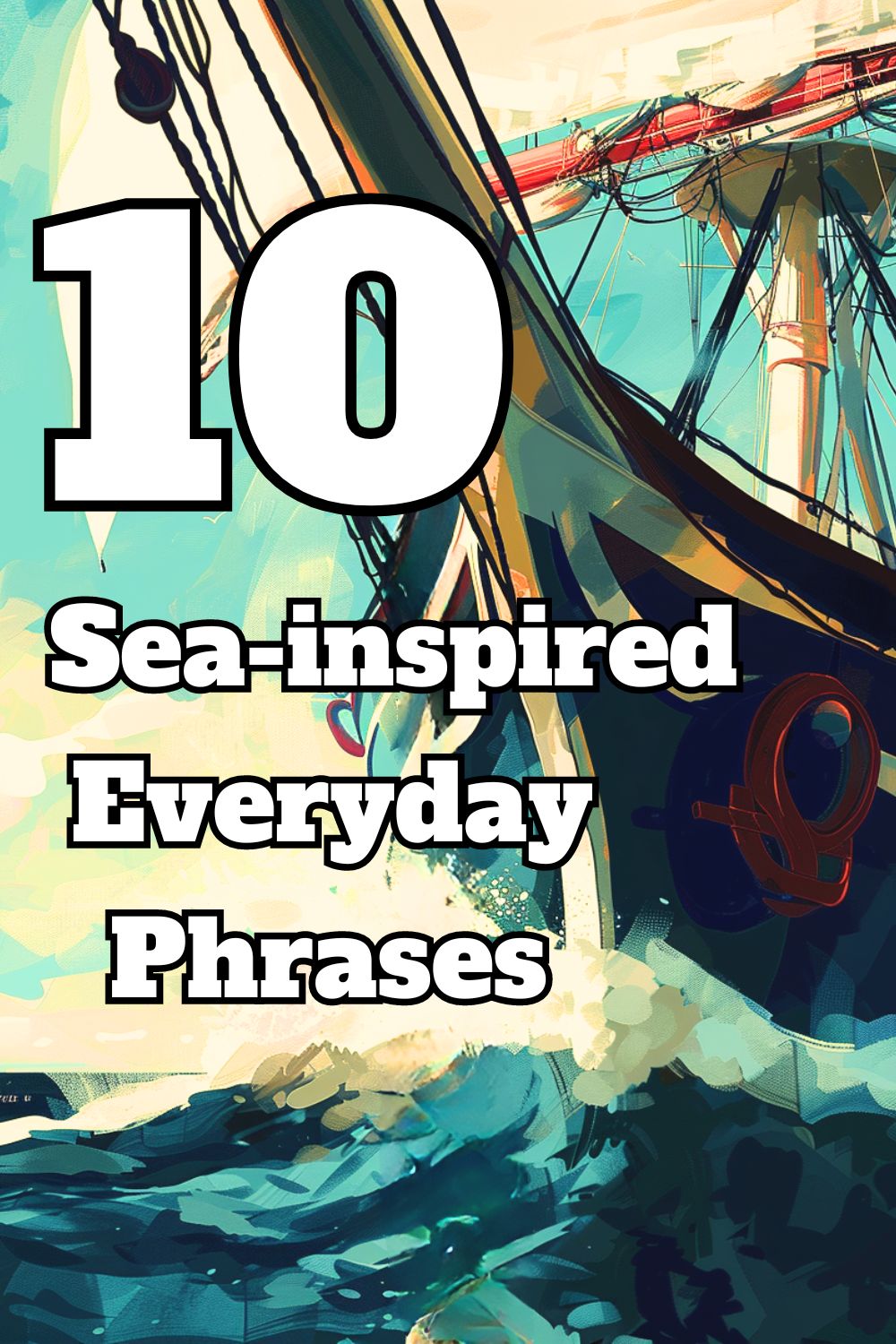Ahoy, landlubbers and word nerds! Ever wonder why we say things like “taking the wind out of someone’s sails” or “three sheets to the wind”? Turns out, a lot of our everyday phrases are straight out of a sailor’s handbook. Yup, those old sea dogs sure knew how to turn a phrase!
Whether you’re navigating the treacherous waters of office politics or just trying to keep your life on an even keel, these nautical nuggets are here to help you sail smoothly. So, hoist the anchor and discover the fascinating world of sailing terms that have snuck into our daily lingo!
1. “Taking the Wind Out of Someone’s Sails”
Ever been super excited about something only to have someone burst your bubble? Congratulations, you’ve had the wind taken out of your sails! This phrase hails from the high seas where one ship could slow another by blocking the wind to its sails. It means someone has deflated your enthusiasm or thwarted your plans in everyday life. So, the next time your boss shoots down your brilliant idea, just remember, it’s a classic case of nautical sabotage!
Examples
Example 1: When his colleague criticized his proposal in the meeting, it really took the wind out of his sails.
Example 2: She was excited about her new dress until her friend said it was out of style, taking the wind out of her sails.
2. “Anchors Aweigh”
“Anchors Aweigh” is a spirited call to action that signals the start of a journey. Originating from the naval tradition, it means the anchor has been lifted from the seabed, and the ship is ready to set sail. Nowadays, it’s used to mark the beginning of any new venture or significant change, often with a sense of excitement and anticipation.
Examples
Example 1: After months of planning, the new project is finally ready to launch. Anchors aweigh!
Example 2: With her college degree in hand, she felt it was time to explore new opportunities. Anchors aweigh!
3. “In the Same Boat”
“In the Same Boat” is a phrase that highlights a shared experience or situation, particularly one involving common challenges or hardships. It paints a vivid picture of sailors on a single vessel, navigating the same waters and facing the same storms. Today, it reminds us that we’re not alone in our struggles or endeavors, fostering a sense of solidarity and mutual understanding.
Examples
Example 1: During the team meeting, everyone realized they were all struggling with the same tight deadlines, making them feel like they were in the same boat.
Example 2: After the company announced layoffs, the employees felt they were all in the same boat, uncertain about their future.
4. “Loose Cannon”
Originally referring to the dangerous situation of an unsecured cannon on a ship rolling around and causing havoc, “Loose Cannon” now describes an unpredictable person who might cause trouble due to their erratic behavior. This term captures the potential for chaos and the need for caution when dealing with such individuals.
Examples
Example 1: His unpredictable outbursts during meetings make him a loose cannon that the team has to carefully manage.
Example 2: The coach benched the star player, fearing his recent behavior made him a loose cannon on the field.
5. “Batten Down the Hatches”
“Batten Down the Hatches” is a phrase that originated from the practice of securing a ship’s hatches with wooden battens to prepare for stormy weather. In modern usage, it means to prepare thoroughly for a challenging situation or impending trouble. This phrase emphasizes readiness and caution, often invoking the image of bracing for impact.
Examples
Êxample 1: With the economic downturn looming, the company decided to batten down the hatches and cut unnecessary expenses.
Example 2: Hearing the weather forecast predicting a severe storm, the family decided to batten down the hatches by stocking up on supplies and securing their home.
6. “Know the Ropes”
“Know the Ropes” is an expression that stems from sailing, where it was crucial for sailors to be familiar with the complex system of ropes used to control the sails. Today, it means being well-versed or experienced in a particular task or field. This phrase underscores the importance of knowledge and expertise.
Examples
Example 1: After six months on the job, she really knows the ropes and can handle any challenge that comes her way.
Example 2: It’s essential to know the ropes if you want to succeed in the fast-paced world of digital marketing.
7. “Three Sheets to the Wind”
“Three Sheets to the Wind” is a colorful nautical term that originally referred to the ropes (sheets) used to control a ship’s sails. If three sheets were loose, the sails would flap uncontrollably, making the ship unsteady, much like someone who is very drunk. Today, it describes someone who is heavily intoxicated and struggling to stay upright.
Examples
Example 1: After the office party, he was three sheets to the wind and needed a cab to get home safely.
Example 2: She stumbled out of the bar, clearly three sheets to the wind after celebrating her promotion a bit too enthusiastically.
8. “Cut and Run”
“Cut and Run” is a phrase that originated from the practice of cutting the anchor rope to quickly sail away when a ship was in danger. Nowadays, it means to leave a situation abruptly, often to avoid trouble or danger. This expression highlights the urgency and decisiveness of making a quick exit.
Examples
Example 1: When the meeting turned into a heated argument, she decided to cut and run before things got worse.
Example 2: Faced with mounting debts, he chose to cut and run, leaving the city without telling anyone.
9. “Full to the Gunwales”
“Full to the Gunwales” is a phrase that comes from the gunwales (the upper edges of the sides of a ship), which would indicate how high a ship could be loaded before being at risk of sinking. Nowadays, it means being completely full or overflowing. This vivid imagery conveys the idea of being filled to maximum capacity.
Examples
Example 1: The party was full to the gunwales with guests, making it hard to move around.
Example 2: His schedule is full to the gunwales this week, so he won’t be able to meet for lunch.
10. “On an Even Keel”
“On an Even Keel” is a phrase that originates from the balanced positioning of a ship’s keel, which is essential for smooth and stable sailing. When a ship is on an even keel, it means it’s level and steady in the water. Today, this phrase is used to describe situations, people, or processes that are stable and well-balanced, indicating a sense of calm and order.
Examples
Example 1: After a few turbulent months, the company is finally back on an even keel.
Example 2: She managed to get her life on an even keel after moving to a new city and starting a new job.

Hey fellow Linguaholics! It’s me, Marcel. I am the proud owner of linguaholic.com. Languages have always been my passion and I have studied Linguistics, Computational Linguistics and Sinology at the University of Zurich. It is my utmost pleasure to share with all of you guys what I know about languages and linguistics in general.



